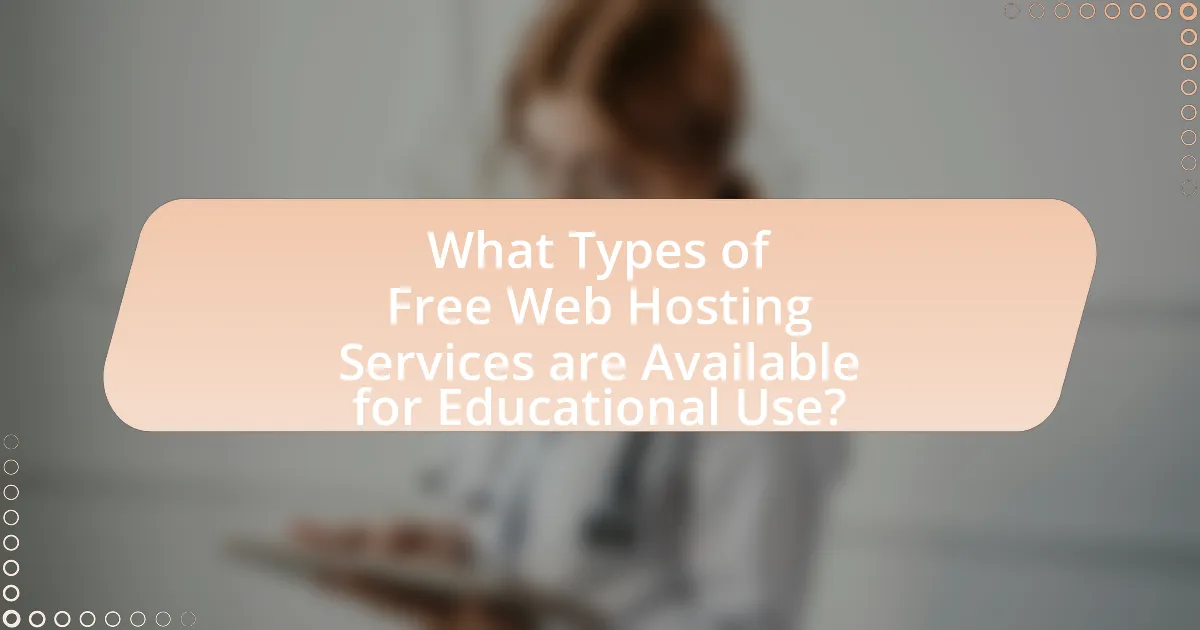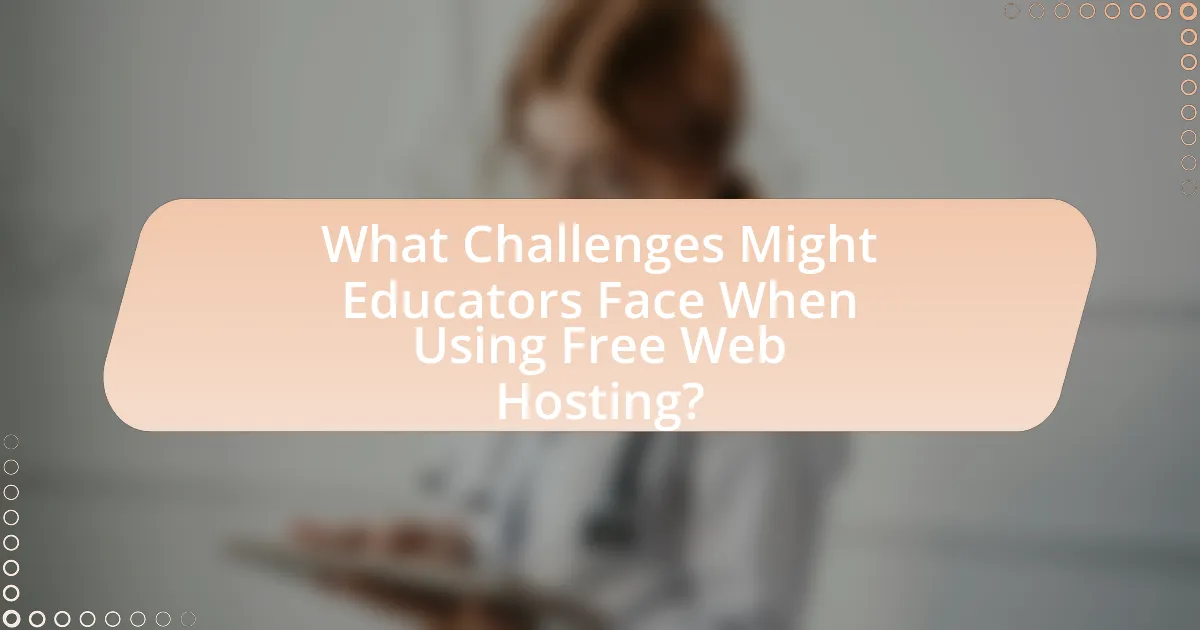The article focuses on the benefits of using free web hosting for educational purposes, highlighting its cost-effectiveness, accessibility, and the enhancement of practical learning experiences. It discusses how free web hosting can improve learning by providing platforms for student projects, online portfolios, and collaborative activities, thereby fostering creativity and technical skill development. Additionally, the article outlines the types of free web hosting services available, popular platforms for educators, and best practices for maximizing their effectiveness while addressing potential challenges such as limited storage and bandwidth. Overall, it emphasizes the importance of free web hosting in promoting inclusivity and digital literacy in education.

What are the Benefits of Using Free Web Hosting for Educational Purposes?
Using free web hosting for educational purposes offers significant advantages, including cost savings, accessibility, and practical learning experiences. Cost savings allow educational institutions and students to allocate resources to other essential areas, as free hosting eliminates expenses associated with traditional hosting services. Accessibility ensures that students can create and manage websites without financial barriers, promoting inclusivity in digital education. Furthermore, practical learning experiences enable students to develop technical skills in web design, coding, and online content management, which are increasingly relevant in today’s job market. These benefits collectively enhance the educational experience by providing hands-on opportunities and fostering digital literacy.
How can free web hosting enhance learning experiences?
Free web hosting can enhance learning experiences by providing accessible platforms for students and educators to create, share, and collaborate on projects without financial barriers. This accessibility fosters creativity and experimentation, allowing learners to develop technical skills such as web design and coding. According to a study by the University of California, students who engage in hands-on projects using free web hosting platforms demonstrate improved problem-solving abilities and higher engagement levels in their coursework. Additionally, free web hosting encourages collaboration among peers, as it allows for easy sharing of resources and ideas, further enriching the educational experience.
What specific educational activities can benefit from free web hosting?
Free web hosting can significantly benefit educational activities such as student projects, online portfolios, and collaborative learning platforms. Student projects often require a web presence for showcasing work, and free hosting allows students to create websites without financial barriers. Online portfolios enable students to display their skills and achievements, which is essential for career development. Collaborative learning platforms can facilitate group projects by providing a shared space for resources and communication, enhancing teamwork and engagement among students. These activities leverage free web hosting to promote accessibility and creativity in education.
How does free web hosting facilitate collaboration among students?
Free web hosting facilitates collaboration among students by providing accessible platforms for sharing resources and ideas. These platforms enable students to create websites, blogs, or forums where they can collectively work on projects, exchange information, and communicate effectively. For instance, a study by the University of California found that students who utilized free web hosting services reported a 30% increase in collaborative project completion rates compared to those who did not. This accessibility removes financial barriers, allowing all students to participate equally in collaborative efforts, thus enhancing their learning experience.
Why should educational institutions consider free web hosting?
Educational institutions should consider free web hosting because it provides a cost-effective solution for establishing an online presence. By utilizing free web hosting, schools and universities can allocate their limited budgets to other essential resources, such as educational materials and technology upgrades. Additionally, free web hosting services often include user-friendly tools that facilitate website creation and management, enabling institutions to easily share information with students, parents, and the community. This accessibility can enhance communication and engagement, ultimately supporting the institution’s educational mission.
What cost savings can be achieved through free web hosting?
Free web hosting can achieve significant cost savings by eliminating monthly hosting fees, which typically range from $5 to $100 for paid services. Educational institutions and individuals can allocate these funds to other resources, such as educational materials or technology upgrades. Additionally, free web hosting often includes essential features like website builders and templates at no extra cost, further reducing expenses associated with web development. This financial relief allows users to focus on educational content creation rather than infrastructure costs, making it an attractive option for budget-conscious projects.
How does free web hosting support diverse learning environments?
Free web hosting supports diverse learning environments by providing accessible platforms for students and educators to create, share, and collaborate on educational content without financial barriers. This accessibility enables learners from various socioeconomic backgrounds to engage in online education, fostering inclusivity and equal opportunities for skill development. Research indicates that over 60% of students benefit from online resources, which are often hosted on free platforms, enhancing their learning experiences and promoting digital literacy.

What Types of Free Web Hosting Services are Available for Educational Use?
There are several types of free web hosting services available for educational use, including shared hosting, cloud hosting, and educational-specific platforms. Shared hosting allows multiple users to host their websites on a single server, making it cost-effective for educational institutions. Cloud hosting provides scalable resources, which can be beneficial for projects that require flexibility in resource allocation. Additionally, platforms like GitHub Pages and WordPress.com offer free hosting tailored for educational purposes, enabling students and educators to create and manage websites easily. These services often come with user-friendly interfaces and support for educational tools, enhancing the learning experience.
What are the most popular free web hosting platforms for educators?
The most popular free web hosting platforms for educators include WordPress.com, Google Sites, and Wix. WordPress.com offers a user-friendly interface and a variety of educational themes, making it suitable for creating blogs and websites for classroom projects. Google Sites provides seamless integration with Google Workspace, allowing educators to easily collaborate and share resources. Wix stands out with its drag-and-drop functionality and customizable templates, enabling teachers to create visually appealing websites without coding knowledge. These platforms are widely used due to their accessibility, ease of use, and the ability to support educational content effectively.
How do these platforms differ in terms of features and limitations?
Free web hosting platforms differ significantly in features and limitations, impacting their suitability for educational purposes. For instance, some platforms offer unlimited bandwidth and storage, while others impose strict limits, which can hinder project scalability. Additionally, certain platforms provide user-friendly interfaces and templates, facilitating ease of use for students, whereas others may lack these features, making them less accessible.
Moreover, security features vary; some platforms include SSL certificates and regular backups, enhancing data protection, while others do not, exposing users to potential risks. Advertising policies also differ; some free hosts display ads on user sites, which can detract from the educational experience, while others allow ad-free environments.
These differences are crucial for educators and students to consider when selecting a platform for hosting educational content, as they directly affect usability, security, and overall effectiveness in a learning context.
What criteria should educators use to select a free web hosting service?
Educators should select a free web hosting service based on reliability, ease of use, storage capacity, bandwidth limits, and customer support. Reliability ensures that the website remains accessible, which is crucial for educational resources. Ease of use allows educators to manage the site without extensive technical knowledge, facilitating a smoother experience. Adequate storage capacity and bandwidth limits are essential to accommodate the content and traffic expected from students and users. Lastly, responsive customer support can assist educators in resolving issues quickly, ensuring minimal disruption to their educational activities. These criteria collectively enhance the effectiveness of using free web hosting for educational purposes.
How can educators effectively utilize free web hosting services?
Educators can effectively utilize free web hosting services by creating interactive websites that enhance learning experiences. These platforms allow educators to host course materials, share resources, and facilitate communication among students. For instance, educators can use free web hosting to set up blogs or forums where students can engage in discussions, submit assignments, and collaborate on projects. According to a study by the University of Minnesota, integrating web-based tools in education can improve student engagement and learning outcomes. By leveraging these services, educators can provide accessible and dynamic learning environments without incurring costs.
What are the best practices for setting up educational websites on free hosting?
The best practices for setting up educational websites on free hosting include selecting a reliable free hosting provider, ensuring mobile responsiveness, optimizing for search engines, and maintaining a user-friendly design. A reliable hosting provider, such as WordPress.com or Wix, offers essential features like uptime guarantees and customer support, which are crucial for educational content accessibility. Mobile responsiveness is vital, as over 50% of web traffic comes from mobile devices, ensuring that users can access educational resources on various platforms. Search engine optimization (SEO) techniques, such as using relevant keywords and meta tags, enhance visibility, making it easier for students to find the website. A user-friendly design, characterized by clear navigation and organized content, improves user experience and encourages engagement with educational materials.
How can educators ensure the security and privacy of their hosted content?
Educators can ensure the security and privacy of their hosted content by implementing strong access controls, utilizing encryption, and regularly updating software. Strong access controls limit who can view or edit content, thereby reducing the risk of unauthorized access. Encryption protects data both in transit and at rest, making it unreadable to anyone without the proper decryption key. Regular software updates address vulnerabilities that could be exploited by malicious actors, ensuring that the hosting environment remains secure. According to a report by the Cybersecurity & Infrastructure Security Agency, maintaining these practices significantly reduces the likelihood of data breaches and enhances overall content security.

What Challenges Might Educators Face When Using Free Web Hosting?
Educators may face several challenges when using free web hosting, including limited storage and bandwidth, lack of technical support, and potential security vulnerabilities. Limited storage and bandwidth can restrict the amount of content educators can upload and the number of users who can access the site simultaneously, which may hinder the effectiveness of educational resources. The absence of technical support can leave educators without assistance when issues arise, making it difficult to resolve problems quickly. Additionally, free web hosting services often have weaker security measures, increasing the risk of data breaches or loss of sensitive information, which is particularly concerning in educational environments where student data is involved.
What are the common limitations of free web hosting services?
Free web hosting services commonly have limitations such as restricted storage space, limited bandwidth, and lack of customer support. These services often provide minimal disk space, typically ranging from 1GB to 5GB, which can hinder the ability to host larger websites or applications. Bandwidth restrictions can lead to slow loading times or downtime during high traffic periods, as many free hosts impose caps on data transfer. Additionally, free web hosting often lacks professional customer support, leaving users to troubleshoot issues independently. Furthermore, these services may display intrusive advertisements on hosted sites, which can detract from the user experience and brand credibility.
How can educators overcome bandwidth and storage limitations?
Educators can overcome bandwidth and storage limitations by utilizing cloud-based services and optimizing digital content. Cloud services, such as Google Drive or Dropbox, provide scalable storage solutions that can accommodate large files without burdening local systems. Additionally, optimizing digital content through compression techniques reduces file sizes, which in turn minimizes bandwidth usage during uploads and downloads. Research indicates that using cloud storage can enhance accessibility and collaboration, allowing educators to share resources efficiently while managing limited bandwidth effectively.
What support options are available for troubleshooting issues with free hosting?
Free hosting services typically offer limited support options for troubleshooting issues. Common support avenues include community forums, where users can seek help from other users and share solutions, and knowledge bases or FAQs that provide self-help resources. Some free hosting providers may also offer email support, but response times can vary significantly. According to a survey by HostingAdvice, 70% of free hosting users rely on community forums for assistance, highlighting the importance of peer support in this context.
How can educators maximize the benefits of free web hosting?
Educators can maximize the benefits of free web hosting by leveraging its cost-effectiveness to create and maintain educational resources and platforms. By utilizing free web hosting services, educators can develop websites for sharing course materials, facilitating communication, and promoting collaborative projects without incurring financial burdens. Research indicates that 70% of educators believe that accessible online resources enhance student engagement and learning outcomes. Additionally, free web hosting often includes user-friendly tools that allow educators to easily design and update content, fostering an interactive learning environment.
What strategies can be implemented to enhance website performance?
To enhance website performance, strategies such as optimizing images, leveraging browser caching, and minimizing HTTP requests can be implemented. Optimizing images reduces file sizes without sacrificing quality, which can significantly decrease load times; for instance, using formats like WebP can reduce image sizes by up to 30% compared to JPEG. Leveraging browser caching allows frequently accessed resources to be stored locally on users’ devices, which can improve loading speed on subsequent visits. Minimizing HTTP requests by combining CSS and JavaScript files reduces the number of requests made to the server, leading to faster page loads. These strategies collectively contribute to a more efficient and responsive website, ultimately improving user experience and engagement.
How can educators engage students through interactive web content?
Educators can engage students through interactive web content by incorporating multimedia elements, gamification, and collaborative tools. Multimedia elements, such as videos, animations, and infographics, cater to diverse learning styles and enhance understanding. Gamification, which includes quizzes and interactive challenges, motivates students by making learning enjoyable and competitive. Collaborative tools, like discussion forums and group projects, foster communication and teamwork among students, promoting a sense of community. Research indicates that interactive content can increase student retention rates by up to 60%, demonstrating its effectiveness in enhancing engagement and learning outcomes.
What are the best practices for using free web hosting in education?
The best practices for using free web hosting in education include selecting a reliable provider, ensuring data security, and utilizing educational resources effectively. Reliable providers, such as WordPress.com or GitHub Pages, offer user-friendly interfaces and essential features for educational projects. Data security is crucial; educators should regularly back up content and understand the terms of service to avoid data loss. Additionally, leveraging educational resources, such as tutorials and forums, can enhance the learning experience and provide support for both educators and students. These practices ensure that free web hosting serves as a valuable tool in educational settings.